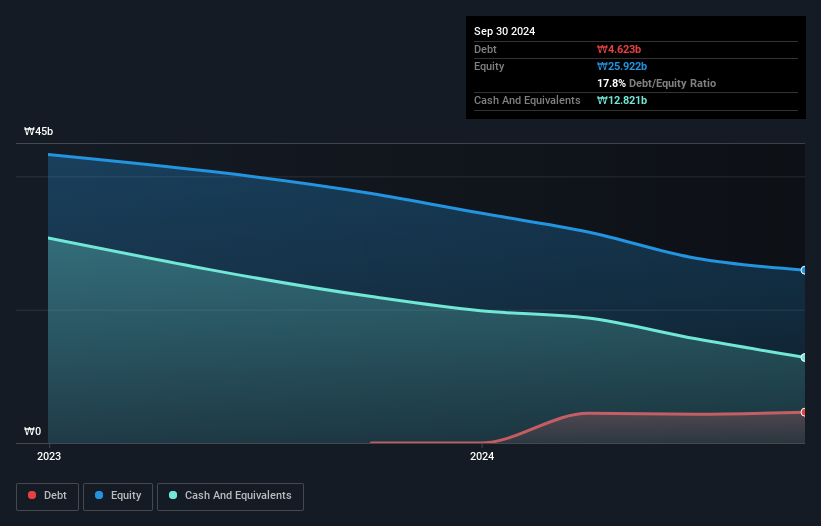
Warren Buffett famously said, 'Volatility is far from synonymous with risk.' So it might be obvious that you need to consider debt, when you think about how risky any given stock is, because too much debt can sink a company. As with many other companies GENINUS Inc. (KOSDAQ:389030) makes use of debt. But is this debt a concern to shareholders?
When Is Debt A Problem?
Debt is a tool to help businesses grow, but if a business is incapable of paying off its lenders, then it exists at their mercy. In the worst case scenario, a company can go bankrupt if it cannot pay its creditors. While that is not too common, we often do see indebted companies permanently diluting shareholders because lenders force them to raise capital at a distressed price. Of course, the upside of debt is that it often represents cheap capital, especially when it replaces dilution in a company with the ability to reinvest at high rates of return. The first thing to do when considering how much debt a business uses is to look at its cash and debt together.
Check out our latest analysis for GENINUS
What Is GENINUS's Net Debt?
As you can see below, at the end of September 2024, GENINUS had ₩4.62b of debt, up from ₩430 a year ago. Click the image for more detail. But on the other hand it also has ₩12.8b in cash, leading to a ₩8.20b net cash position.

How Strong Is GENINUS' Balance Sheet?
The latest balance sheet data shows that GENINUS had liabilities of ₩7.97b due within a year, and liabilities of ₩1.11b falling due after that. On the other hand, it had cash of ₩12.8b and ₩3.75b worth of receivables due within a year. So it can boast ₩7.50b more liquid assets than total liabilities.
This surplus suggests that GENINUS is using debt in a way that is appears to be both safe and conservative. Due to its strong net asset position, it is not likely to face issues with its lenders. Succinctly put, GENINUS boasts net cash, so it's fair to say it does not have a heavy debt load! When analysing debt levels, the balance sheet is the obvious place to start. But you can't view debt in total isolation; since GENINUS will need earnings to service that debt. So if you're keen to discover more about its earnings, it might be worth checking out this graph of its long term earnings trend.
In the last year GENINUS had a loss before interest and tax, and actually shrunk its revenue by 3.1%, to ₩6.7b. That's not what we would hope to see.
So How Risky Is GENINUS?
By their very nature companies that are losing money are more risky than those with a long history of profitability. And we do note that GENINUS had an earnings before interest and tax (EBIT) loss, over the last year. And over the same period it saw negative free cash outflow of ₩14b and booked a ₩12b accounting loss. Given it only has net cash of ₩8.20b, the company may need to raise more capital if it doesn't reach break-even soon. Overall, its balance sheet doesn't seem overly risky, at the moment, but we're always cautious until we see the positive free cash flow. The balance sheet is clearly the area to focus on when you are analysing debt. But ultimately, every company can contain risks that exist outside of the balance sheet. Case in point: We've spotted 5 warning signs for GENINUS you should be aware of, and 1 of them doesn't sit too well with us.
When all is said and done, sometimes its easier to focus on companies that don't even need debt. Readers can access a list of growth stocks with zero net debt 100% free, right now.
New: Manage All Your Stock Portfolios in One Place
We've created the ultimate portfolio companion for stock investors, and it's free.
• Connect an unlimited number of Portfolios and see your total in one currency
• Be alerted to new Warning Signs or Risks via email or mobile
• Track the Fair Value of your stocks
Have feedback on this article? Concerned about the content? Get in touch with us directly. Alternatively, email editorial-team (at) simplywallst.com.
This article by Simply Wall St is general in nature. We provide commentary based on historical data and analyst forecasts only using an unbiased methodology and our articles are not intended to be financial advice. It does not constitute a recommendation to buy or sell any stock, and does not take account of your objectives, or your financial situation. We aim to bring you long-term focused analysis driven by fundamental data. Note that our analysis may not factor in the latest price-sensitive company announcements or qualitative material. Simply Wall St has no position in any stocks mentioned.
About KOSDAQ:A389030
GENINUS
A bioinformation analysis company, engages in the research and development, manufacture, and sale of next generation sequencing (NGS) - based genome analysis solutions in South Korea.
Slight with mediocre balance sheet.
Market Insights
Community Narratives



